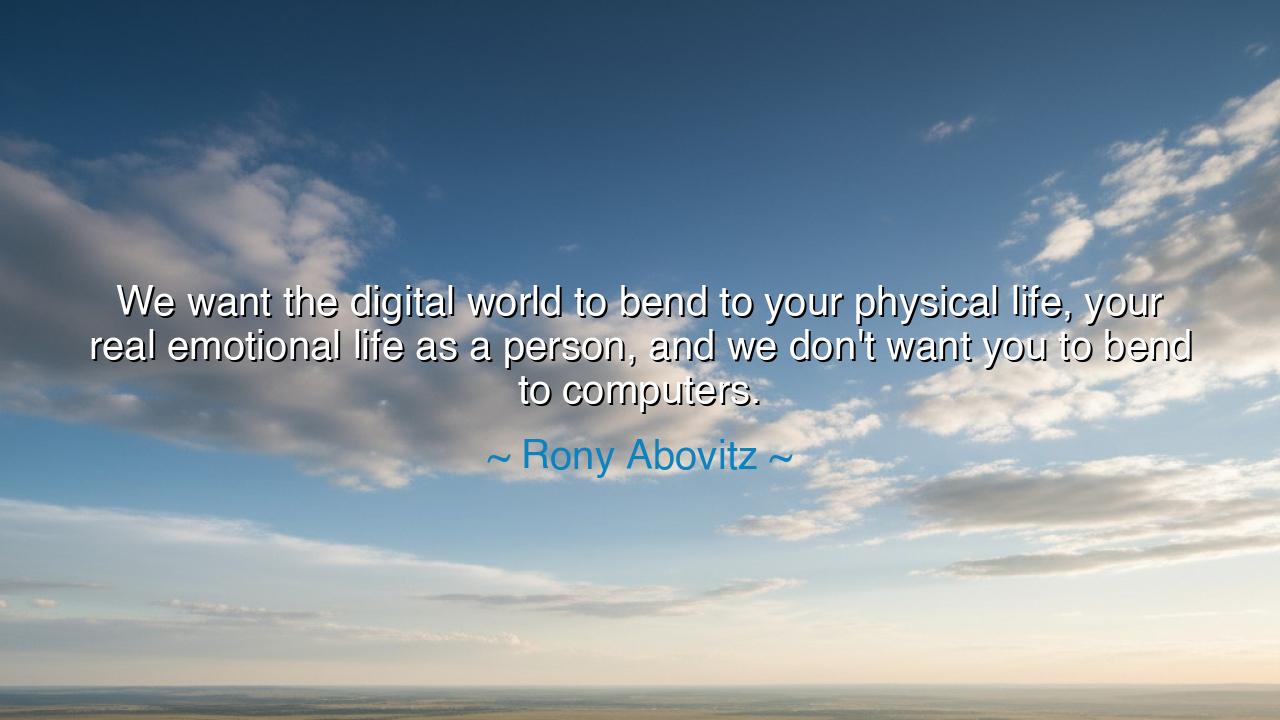
We want the digital world to bend to your physical life, your
We want the digital world to bend to your physical life, your real emotional life as a person, and we don't want you to bend to computers.






In the visionary and humanistic words of Rony Abovitz, the creator and dreamer behind the frontier of digital reality, we find a truth both prophetic and deeply humane: “We want the digital world to bend to your physical life, your real emotional life as a person, and we don’t want you to bend to computers.” These are not merely the words of a technologist—they are the cry of a philosopher, a guardian of human essence in an age of artificial creation. Abovitz reminds us that technology, magnificent though it may be, is but a tool, a servant to the heart and mind—not a master. His statement calls for balance between progress and humanity, between the machine’s cold logic and the spirit’s living warmth.
From the earliest dawn of civilization, mankind has built tools to extend his reach: the plow, the compass, the press, the engine, and now, the computer. Each invention brought new strength, but also new temptation—the temptation to let the tool rule its maker. The ancient Greeks warned of this in their myths. Daedalus, the craftsman who fashioned wings for himself and his son, Icarus, sought to defy nature. Yet when Icarus soared too close to the sun, he fell, undone by his own invention. So too, Abovitz cautions us in this modern myth of silicon and light: the digital world must serve our lives, not enslave them. It must adapt to our humanity, not demand that we reshape ourselves to fit its circuits.
The origin of this quote lies in Abovitz’s work at the intersection of technology and the human experience. As founder of Magic Leap, he sought to create technology that blended seamlessly with the senses—an experience that enhances reality rather than replacing it. In his words, we hear a vision of technology that honors the user’s body, emotions, and perception. Unlike the cold screens that draw us inward, his dream was of a digital realm that coexists gently with our physical world, allowing our attention, our relationships, and our imagination to flourish freely. He speaks as one who sees both the promise and peril of invention: that we risk losing our humanity if we forget that the machine was made for man, not man for the machine.
Throughout history, those who have pursued knowledge have wrestled with this very tension. Consider the story of Johannes Gutenberg, whose printing press revolutionized the world by multiplying the written word. The invention brought enlightenment—but also chaos. Knowledge once confined to the wise was unleashed to all, and humanity had to learn anew how to live with the power it had created. In every age, this same trial returns: invention expands our reach, but it also tests our restraint. Abovitz’s words are the echo of this eternal lesson, spoken to an era where digital light has begun to eclipse the human face.
He calls us back to the real emotional life—the world of breath, of touch, of presence. For when we bend ourselves to technology, we risk forgetting what it means to be alive. The screen becomes our mirror, and we no longer see the eyes of others. The notifications that promise connection often steal our peace. Abovitz’s wisdom reminds us to reclaim dominion—to make our tools invisible servants to our well-being. The digital world should extend the grace of human creativity, not demand the sacrifice of our time, our rest, and our joy.
There is a lesson here that speaks to the core of our age: humanity must remain at the center of progress. Just as the ancients balanced mind and body, we must balance the virtual and the real. Let the digital world enhance your creativity, but not consume your attention. Use it to learn, but not to escape. Engage with it as you would with a loyal companion—firmly, wisely, and without surrender. The moment the tool dictates your rhythm, you have ceased to be its master.
So, O listener, remember this teaching: bend not your soul to the machine. Let your devices serve the pulse of your life, not replace it. Walk in the sunlight, touch the earth, hear the laughter of others not through a screen but through the air itself. Let the digital world reflect your humanity, not erase it. As Rony Abovitz teaches, technology must curve around our hearts, our senses, and our stories—never the other way around. For when the creation bends to its creator, when the virtual bows before the real, we preserve what is most sacred in us: the living flame of human spirit.






AAdministratorAdministrator
Welcome, honored guests. Please leave a comment, we will respond soon